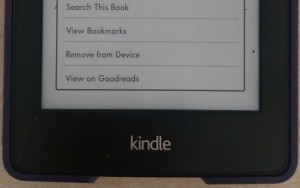I don’t ordinarily attach long subtitles to my blog posts; but if I did, this one would be subtitled “How to Manage Your Brain like a Kindle.” I’ve often thought that what we encounter in our everyday lives goes a long way toward shaping the world as we perceive it. Though we may not think much about what’s in and around our homes and workplaces, often the small details have more subconscious impact than we might expect. Clearing away physical clutter can leave us feeling that life in general has fewer obstacles and is easier to navigate.
The same principle holds true for the clutter in our minds. We’d rather not have useless old worries and bad memories taking up space in our brains, but somehow we end up mentally tripping over them anyway. In meditation, we might picture ourselves calmly breathing out the stale negative energy, disposing of mental garbage in an imaginary bin, or something similar. Those are tried and true methods handed down for many generations. In the modern world we also have plenty of computer metaphors available—an imaginary Delete key, a data dump, and so forth. It’s often said that the computer age is changing how our brains work, and I am curious as to how computer-inspired meditations compare to the old-fashioned variety.
My latest exploration along those lines is to picture my brain as a Kindle. Rather than having all the books in view like an actual bookshelf, a Kindle (or other ebook reader) generally contains only the items that are currently being read, while everything else in the owner’s library is stored in the cloud. That way, the Kindle’s home screen does not get cluttered. After reading a book or other item, it’s quick and easy to take it off the Kindle by selecting “remove from device.”
Recently I’ve been making an effort to do the same with unwanted thoughts—when I notice them popping up, I do an imaginary “remove from device” and send them back to the “cloud” of whatever does not need my attention in the moment. This approach seems well suited to dealing with past drama such as rehashing old arguments. I remind myself that I’ve been finished with this story for a long time, and then I reinforce that message by picturing its removal. Maybe I’ll find a worthwhile lesson in it someday, but for now it can just go back to the cloud with everything else that’s not currently useful.

